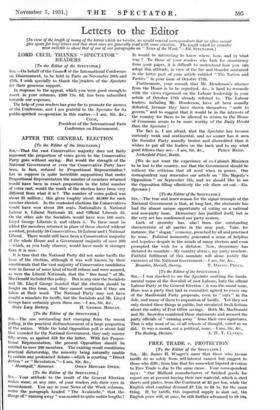AFTER THE GENERAL ELECTION [To the Editor of the SPECTATOR.]
SIR,—That the vast Conservative majority does not fairly represent the proportion of votes given to the Conservative Party goes without saying. But would the strength of the National. Government or even the Conservative Party have been, in fact, reduced by Proportional Representation ? Let us suppose (a quite incredible supposition) that under Proportional Representation the number of members returned would have been in exact proportion to the total number of votes cast, would the result of the election have been very different from what it is ? The number of votes polled was about 21 million ; this gives roughly about 40,000 for each member elected. In the contested elections the Conservatives would have won about 298 seats, Nationalists 2, National Labour 8, Liberal Nationals 22, and Official Liberals 33. On the other side the Socialists would have won 166 seats, Lloyd George Liberals 2, and others 5. To these must be added the members returned in place of those elected without a contest, probably 50 Conservatives, 10 Labour and 1 National Liberal. There would still have been a Conservative majority of the whole House and a Government majority of over 200 —which, as you truly observe, would have made it stronger than it is now.
It is true that the National Party did not make tariffs the issue of the election, although it was well known by their constituents that the vast majority of Conservative candidates were in favour of some kind of tariff reform and were assured, as were the Liberal Nationals, that the " free hand " of Mr. MacDonald included this policy. But in any case the Socialists and Mr. Lloyd George insisted that the election should be fought on this issue, and they cannot complain if they are taken at their word. The National Party may not have sought a mandate for tariffs, but the Socialists and Mr. Lloyd George have certainly given them one.—I am, Sir, &c.,














































 Previous page
Previous page